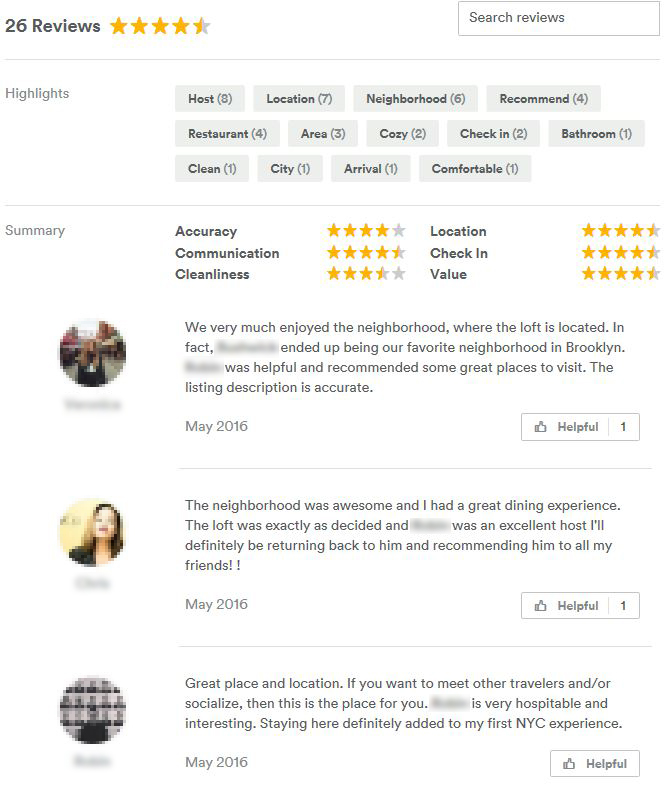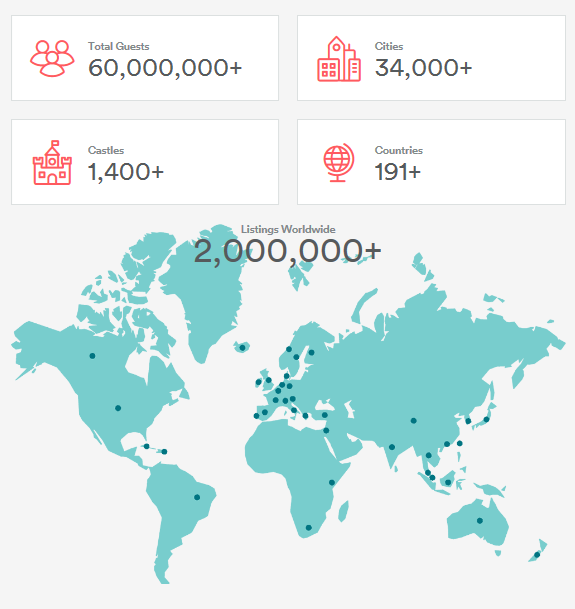(Part Two of a three-part series on Chip Conley and Airbnb.)
Building trust and engagement—something every KM and community manager should know how to do, right? It never goes away as a hot issue and continues to be one of the most-asked questions APQC gets from our customers. APQC has provided best practices and actionable advice for almost two decades. In our continuing search for new and fresh perspectives, I recently interviewed Chip Conley, Airbnb’s Head of Global Hospitality and Strategy, to get some insights on how Airbnb builds trust in a community of people who don’t even work for them: their hosts and guests.
Airbnb is a web-based marketplace enabling people to list and rent privately- owned lodging, from castles to the guest room in your home. Airbnb’s business model depends heavily on a high percentage of their 1.2 million hosts and over 2 million guests honestly rating their experience so that future guests can trust what they are renting sight unseen. (See the example of a rated listing at right, clipped from an Airbnb listing on May 24, 2016.)
owned lodging, from castles to the guest room in your home. Airbnb’s business model depends heavily on a high percentage of their 1.2 million hosts and over 2 million guests honestly rating their experience so that future guests can trust what they are renting sight unseen. (See the example of a rated listing at right, clipped from an Airbnb listing on May 24, 2016.)
In this post, I explore what Airbnb has done to cause its hosts and their guests to trust each other and the system enough to give honest ratings, which in turn feeds a virtuous cycle of reciprocity. The more candid the ratings, the more likely it is that everyone involved trusts the system and the more likely they are to give ratings themselves.
I know what you are thinking: “This will never work in my organization. Our people won’t take the time to give ratings.” Employees are notoriously reluctant to rate or give honest feedback to colleagues about content they posted unless the feedback is anonymous. Even then, employees often don’t want to take the time to rate or tag content.
But work with me here. Airbnb faced similar challenges getting hosts and guests to fairly rate their experience. There are things we can learn from Airbnb about how to build community inside our organizations, especially among people who don’t know each other.
Why Ratings Work at Airbnb
I asked Chip about how much participation they get and why their rating system works.
Chip: What’s interesting is that in the hotel business about 10 to 15 percent of hotel guests will fill out an online survey after they’ve stayed in a hotel. At Airbnb, 70 to 75 percent of our hosts and guests review each other after a stay.
That increased percentage is the difference between a very passive transaction and, in Airbnb’s case, a community. A community is only as good as the trust it has built based on the peer-to-peer review system.
More than half of the travelers who use Airbnb are doing so across borders. They are actually electing to stay in somebody’s home or residence in a foreign country sight unseen—and that can obviously create anxiety.
 An analogy can be drawn to organizations structured around virtual global teams where people are not able to know each other personally, yet have to work together and hand off projects to each other around the globe. The lesson is that the more opportunities members have for an active dialogue or exchange, the more likely they are to continue to participate.
An analogy can be drawn to organizations structured around virtual global teams where people are not able to know each other personally, yet have to work together and hand off projects to each other around the globe. The lesson is that the more opportunities members have for an active dialogue or exchange, the more likely they are to continue to participate.
Host Training
According to Chip, one reason the rating system works is because of the quality of the product: Airbnb provides training on how to describe a property and how to treat guests so they have a great experience. It provides professional photographers so hosts can portray their properties accurately. It offers incentives to its hosts to provide the users with a very localized experience so they get a feeling of a neighborhood, “not just an anonymous, generic, cookie-cutter hotel experience.” This sense of intimacy and relationship, as well as quality, is likely to promote reciprocity by ratings.
In effect, Airbnb trains hosts on how to be the curators of their guests’ experience. Analogously, the best KM community leaders and designers curate their members’ experience.
Reciprocity and Recourse Matter
One may have predicted hosts or guests would hesitate to leave a lukewarm or bad review for fear of offending or provoking the other party. It turns out that one reason for the high participation rate for reviews is that the hosts and guests have an avenue for recourse and an opportunity to make a correction before the rating goes live.
Chip: Since I’ve joined Airbnb, we’ve made a few changes to help increase participation in the review system. Prior to me getting here, a guest and a host could review each other, but whoever reviewed the other first, that review would show up publicly on site. There wasn’t a great ability to provide private feedback from a host to a guest or a guest to a host.
The change we implemented that made a huge difference in terms of how many people are doing reviews was this: Once you review someone, it doesn’t appear until 14 days have passed from the time you stayed there. If you’re a guest and you give a review, and the host doesn’t give a review, it will go up in 14 days, and after that, the host can’t review you.
More than anything, the idea that our community knows that they rely heavily on the feedback from other guests helps to keep our quality high. We will remove from the site guests who are abusive and hosts who don’t give enough attention to their hospitality. Over time, these problem guests and hosts go lower in search rankings and, at some point, we take them off the site.
Recognition
I discussed with Chip how he recognizes and motivates people who aren’t working for him to do a great job. Hosts are working for themselves; they’re like micro-entrepreneurs.
Chip: We have put in place an incentivized “super-host program” where our best hosts earn a badge. So, there’s a sense of motivation around that. There’s a whole collection of things we’ve done to incentivize and motivate hosts. It has certainly been a deep dive into psychology, and I love that.
In sum, as I have said many times—and is backed up by APQC research—any KM or content management system that relies on busy professionals to take time to do administrative tasks like ratings or tagging is like pushing a boulder uphill. I am not recommending that. In fact, the sooner this onerous task can be offloaded to a computer to do 70% of it, the better.
But I do think the take-away for KM and community managers is that even in a very different sharing economy business model like Airbnb’s, training, reciprocity, and recognition for the right behaviors matter when creating trust among community members.
Stay tuned for my third installment of this series next week, diving into Chip’s book Emotional Equations for tips on how to thrive in the face of a constantly shifting economic and work environment.
Check out the rest of my Big Thinkers, Big Ideas interviews on APQC’s Knowledge Base.
Subscribe to the Big Thinkers, Big Ideas podcast on Itunes or on APQCPodcasts on Podbean.
You can connect with me on Twitter @odell_carla